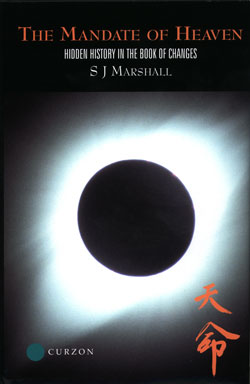Co-editors: Seán Mac Mathúna • John Heathcote
Consulting editor: Themistocles Hoetis
Field Correspondent: Allen Houglande-mail: thefantompowa@fantompowa.org

Those who have read any of Mr Marshall's previous works will already be familiar with his sharp, inquiring and focused frame of mind and style of writing. In this essay - his term not mine - he is looking for a hidden mundane history concealed in the book of changes (Yi Ching). His interest in ancient Chinese history and language and the Yi Ching means that he is totally qualified for the task he has set himself. The resulting text is extremely well referenced (over 50 pages of them - some pointing to other works, some interesting titbits in themselves); and as he unearths the date of King Wu´s (Yes Wu not Wen !) invasion of tyrant King Zhous Shang's empire, as well as a new mundane history coming to light; a different slant and understanding of the basic symbolisms of various hexagrams and their lines become apparent. The crux of his argument for a precise dating of the invasion of the Shang, is the text of Hexagram 55 (Feng) and its lines. If this is taken as talking about a total eclipse of the sun which heralded King Wu´s invasion, and the argument is convincing; then a list of possible eclipse dates sourced from the astrological community gives 4 candidates.The only likely date is 1070 B.C., two of the others being eliminated straight away; since from the area of China in question they would not have been visible. This leaves only 2 contender;s the final selection being made by taking into account a 4th century B.C. oracle bone scholar (Dong Zoubhin) who has already dated the Zhou conquest to 1070 B.C. An interpretation of the original Chinese text of hexagram 55 and its lines enables a reconstruction of the events of the eclipse, King Wen´s death and the ensuing decision of King Wu to embark upon the conquest rather than to spend 3 years in mourning as was customary. The argument continues with King Wen's corpse being carried into battle, and a 30 day trek to the wilds of Mu (the place of battle ). A crossing of the Yellow river on route is found in the texts of hexagrams 18 and 57. This whole story and more is gathered from, and relates to, various hexagrams and ancient texts which makes for a fascinating read. Having dealt with the invasion of the Zhou, the eclipse and various associated matters the book goes on to talk about a couple of Yi Ching/mythological connections (rain magic in hexagram 1 and Yu the Great in hexagrams 44 and 43). The appendices that follow include an explanation of the sources and construction of the classic Willhelm-Baynes translation - very nice - which along with an index referencing hexagrams and their lines against the text, finishes the book very neatly. All in all, a very well argued, fascinating and well written book that would and should make an invaluable addition to the book shelves of any Yi Ching user. The Mandate of Heaven - Hidden History in the Book of Changes by S. J. Marshall. Published by Curzon, London, England, 2001 Reviewed by Lee@digidub.demon.co.uk